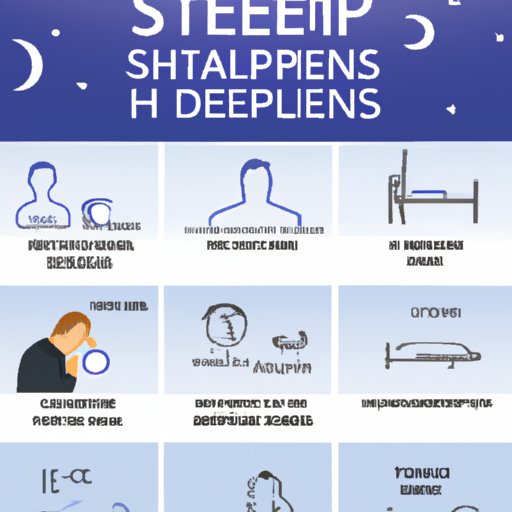Introduction
Sleep deprivation is a serious health issue that affects millions of people around the world. Not getting enough sleep can lead to a variety of physical and mental health issues, including depression, anxiety, and even heart disease. Understanding the science behind sleep deprivation, the effects of going without sleep, and how long people have gone without sleep are important topics of discussion. This article will explore these topics in depth, as well as provide tips for staying awake and alert despite not sleeping.
Investigating the Science Behind Sleep Deprivation
Sleep deprivation occurs when an individual does not get enough sleep on a regular basis. The amount of sleep an individual needs varies depending on age, lifestyle, and overall health. Generally, adults should aim for 7-9 hours of sleep each night, while children and adolescents need 9-10 hours of sleep. If an individual consistently gets less than the recommended amount of sleep, they may be suffering from sleep deprivation.
There are many causes of sleep deprivation, including stress, illness, medication, and lifestyle choices. Stress is one of the most common contributors to sleep deprivation. When faced with a stressful situation, the body produces hormones like cortisol that can make it difficult to fall asleep. Illness or medication can also interfere with the body’s natural sleep-wake cycle, leading to sleep deprivation. Finally, lifestyle choices such as working late, staying up late to watch television, or engaging in other activities can contribute to sleep deprivation.
It is important to understand the benefits of sleep in order to appreciate why sleep deprivation is so dangerous. Sleep helps the body repair itself and restore energy levels. It also helps the brain process information and form memories. In addition, sleep plays an important role in regulating mood, appetite, and immune system function.

Examining the Effects of Going Without Sleep
The effects of sleep deprivation vary depending on how long an individual has been deprived of sleep. Short-term effects include difficulty concentrating, irritability, impaired judgment, and slowed reaction time. Long-term effects can include memory loss, impaired cognitive abilities, weakened immune system, and increased risk of developing chronic illnesses such as diabetes and heart disease.

Exploring How Long People Have Gone Without Sleep
People have gone without sleep for varying lengths of time. There are several extreme cases of people going without sleep for weeks or even months at a time. For example, Randy Gardner, a California high school student, stayed awake for 11 days and 24 minutes in 1964. In 1959, a Californian woman named Maureen Weston went without sleep for 449 hours (nearly 19 days).
It is difficult to determine how long is “too long” to go without sleep. Generally, any period of time without sleep lasting more than two days can lead to serious health consequences. At this point, an individual may experience hallucinations and become disoriented. Prolonged periods of sleep deprivation can also result in death.
A Case Study of Someone Who Went Without Sleep for a Lengthy Period of Time
One extreme case of someone who went without sleep for a lengthy period of time is 17-year-old Thai student Santharuban. He attempted to break the world record for the longest period of time without sleep in 2009. He was monitored by scientists during his attempt and was allowed to take short naps every few hours. Despite taking naps, he did not sleep for a full 24-hour period. After 11 days without sleep, he collapsed and was taken to the hospital.
Santharuban faced several challenges during his attempt. He experienced severe fatigue, headaches, and nausea. He also experienced hallucinations and became disoriented. Despite these difficulties, he managed to stay awake for 11 days and set a new world record.
A List of Tips for Staying Awake and Alert Despite Not Sleeping
If you find yourself in a situation where you must remain awake despite not sleeping, there are several things you can do to help stay alert. First, focus on your diet and exercise. Eating healthy foods and getting regular exercise can help boost energy levels and improve alertness. Second, pay attention to your environment. Make sure the room is well lit and free from noise and distractions. Finally, avoid caffeine and other stimulants as much as possible. While they may give you a temporary energy boost, they can also lead to crashes later on.

Surveying Professional Opinions on How Long You Can Go Without Sleep
Doctors and scientists agree that going without sleep for too long can have serious health consequences. Most doctors recommend getting at least seven hours of sleep per night. Sleep specialists also recommend sticking to a consistent bedtime routine and avoiding caffeine and other stimulants. Finally, they suggest seeking medical help if you are experiencing prolonged periods of insomnia or difficulty sleeping.
Conclusion
Sleep deprivation is a serious health issue that can have serious consequences. Understanding the science behind sleep deprivation, the effects of going without sleep, and how long people have gone without sleep is essential for maintaining good health. This article explored these topics in depth and provided tips for staying awake and alert despite not sleeping. Finally, professional opinions were surveyed on how long you can go without sleep and what to do if you find yourself in a situation where you must remain awake despite not sleeping.


